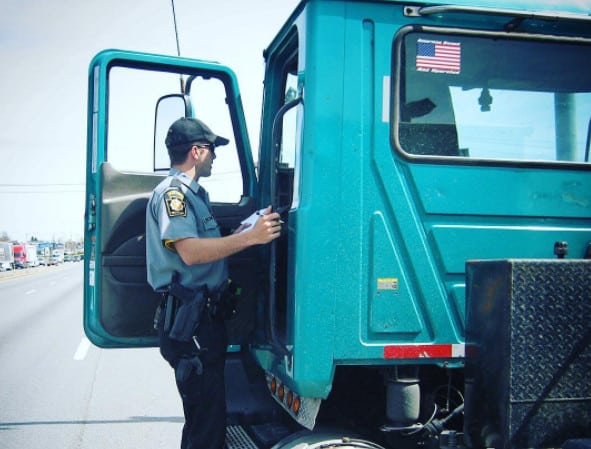Freight opportunities may be available to fleets with ELDs
Nearly 30% of carriers are not yet in full compliance with the upcoming electronic logging device mandate and 8% have equipped less than 33% of their fleets to date, according to the latest Morgan Stanley ELD Survey. The survey also found that 15% of carriers do not expect to be fully compliant when Dec. 18 rolls around.
The investment firm has been conducting quarterly ELD surveys of fleets since May 2016. Among other insights offered, Morgan Stanley expects already compliant carriers (currently 72%) to perform well once the rule goes into effect, the number of carriers expecting capacity decreases continues to grow, and the biggest impact is likely to occur in the first half of 2018.
One other notable, and potentially important, finding of the survey is that many shippers and brokers seem to be taking a “hands-off” approach to ELDs, shifting the burden entirely on the carriers for compliance. That, however, could create a “blind spot” for compliance, Morgan Stanley concludes.
Eighty-two percent of shippers say they will only work with a compliant carrier and 77% of brokers said the same. Given the high number of fleets not expected to be compliant, there could be opportunity for compliant fleets to gain additional market share.
“Shippers and brokers are increasingly expressing that they will not bear responsibility for non-compliant carriers post-deadline. Both shippers and brokers have consistently noted across surveys that since carriers self-certify, it is difficult to detect actual compliance, and also that their contracts with carriers specify that carriers need to be compliant with all laws, regulations, certifications, etc.,” Morgan Stanley reported.
The report was created by Ravi Shanker, equity analyst, and research associates Diane Huang and Spencer Chernus.
The survey also found that 37% of brokers do not know whether their carriers are compliant. Comments from brokers and shippers were nearly unanimous in their opinion that it is not their jobs to monitor ELD compliance, just like they don’t monitor fleet drug testing programs. One broker, though, believes if the ELD enforcement is thorough, “2018 could mirror 2014 in terms of capacity and spot market activity.”
In 2014, robust economic growth quickly gobbled up capacity and drove up spot and contract rates.
A posting on TMW Systems’ blog page seems to back up the broker’s and shipper’s expectations. Robert Voltmann, CEO & and president of the Transportation Intermediaries Association (TIA), says that transportation intermediaries have been taking calls from shippers about the ELD deadline. However, while brokers and 3PLs have a “responsibility to protect their shipper customers by avoiding motor carriers that do not comply with federal laws,” the fact remains, and is backed by the Morgan Stanley survey, that many will not be compliant at the deadline.
“Our members have been hearing from shippers (about ELDs) for a long time, and many wanted all their carriers to be compliant more than a year ago,” Voltmann said. “The reality, of course, is that 90 percent of motor carriers are running five or fewer trucks and are more likely to wait until closer to the deadline, so we’ve been trying to pump the brake a little bit on shipper expectations.”
The survey also found that 31% of respondents (carriers, brokers and shippers) expect a 4-6% capacity reduction. That number is at the highest point since Morgan Stanley began the surveys. Another 10% believe the capacity reduction will be 1-3%, but 20% of those responding think it will be less than 1%.
Shippers and brokers, though, are not in sync with carriers when it comes to the size of the capacity reduction. While 90% of carriers expect at least a 1% capacity hit, only 79% of brokers and 74% of shippers believe so. Carriers expecting at least a 4% decline have increased to 65%, up from 57% in the previous survey. Brokers expecting a 4% decline also climbed, from 23% to 38% in this survey.
The majority of respondents to Morgan Stanley’s survey – 54% – expect the major impacts of the ELD mandate to hit the industry in the first half of 2018. Only 8% believe it will happen in the second half of 2018 or later, while 19% think it will happen in the fourth quarter of this year and 5% think the effects are already being felt.
The driver shortage could also increase, based on how carriers responded to the survey. Carriers that rely on owner-operators who have been among the slowest in the industry to adopt ELDs, are anticipating some leaving the industry. One carrier said that ELDs have “already caused drivers to exit the workforce and [we] anticipate more will leave the pool of available drivers” while another commented that 4-5% of its owner-operators will leave due to non-compliance.
Another carrier, though, thinks compliance will change pricing, which will become “dependent on the shipping/receiving public becoming more efficient with loading/unloading practices.”
The survey also found that fleet size is playing a role in the level of compliance. Only 19% of the carriers who responded to the survey have fewer than 100 tractors, but 52% of them are not yet fully compliant. That number is down from the previous survey in May, when 69% were not yet compliant. Conversely, 87% of fleets with over 200 tractors are complaint, up from 82% in May, suggesting that the larger the fleet, the earlier it has adopted ELDs.
The average fleet size of those responding to the survey is 1,470 tractors with a median fleet size of 375 tractors.











